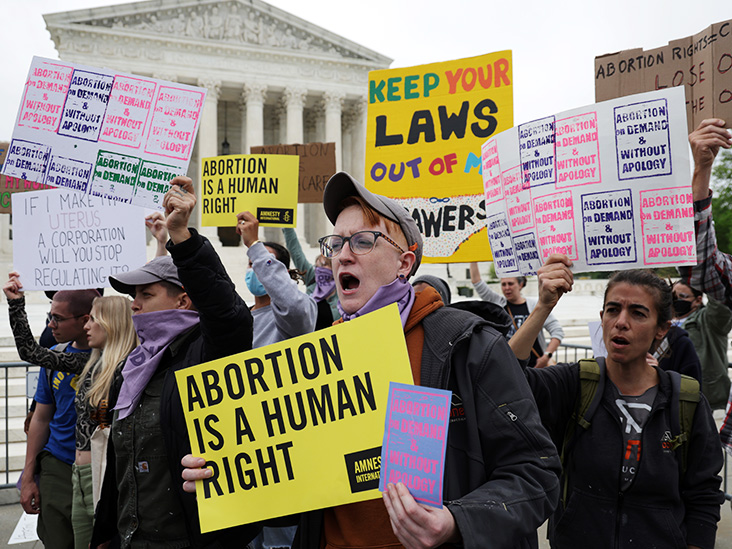Roe vs. Wade: How will it affect women in the future?
Roe vs. Wade protest outside supreme court. From Medical News Today.
After almost fifty years of protecting the reproductive rights of women, Roe vs. Wade was overturned by the Supreme Court on June 24, 2022. Many women that are affected by this are concerned because of their human right to bodily autonomy. “Tracking the States Where Abortion Is Now Banned” by The New York Times says that abortions are now banned in at least 14 states. As recent as September 23, 2022, The New York Times article predicts that “About half the states are expected to enact bans on abortions or other gestational limits on the procedure.” They also say that so far, 8 states have banned abortions with no exceptions for rape or incest.
One of the major issues with the overturning is that the maternal mortality rate is expected to increase with the new restrictions and bans in different states. The CDC stated that “the maternal mortality rate for 2020 was 23.8 deaths per 100,000 live births.” These death rates are only expected to increase as time goes on because more women will be limited with their accessibility to safe abortions. Many of women who seek abortion are doing so because it may save their life. In some states, this will no longer be an option. Limiting abortion access isn’t going to stop women from getting abortions. Women will expose themselves to unsafe conditions in order to get an abortion illegally. This will most likely result in an increase in maternal deaths.
Adoption is not a viable alternative to abortion. Carrying a baby to term is something most women who have abortions don’t want to do. Women might opt for abortion for this reason because of the emotional stress, physical restraints, and financial issues that can come with pregnancy. Gretchen Sisson, a sociologist at University of California, San Francisco, did a study in 2017 that said, “0.5% of births in the US end in adoption.” Many biological mothers were also reported to have suicidal thoughts, feelings of grief, and guilt as a result of their decision to put their newborn up for adoption. In her study, she found that most women seek abortion before considering adoption. She also wrote, “respondents said that the thought of one’s child being out in the world without knowing whether it was being taken care of or who was taking care of it was more guilt-inducing than having an abortion.”
As someone who was adopted, I would agree that women who don’t want to go through pregnancy or childbirth should not have to. In debates, I’m often asked how I would feel if I had been aborted instead, and the answer to that has always been really simple: I wouldn’t know. If my biological mother had decided an abortion was necessary, I would not have any feelings about it nor would I be aware of anything. I am grateful for the life I have, but I still don’t believe that forcing a woman to carry a baby for 9 months is better than letting her choose.
Everyone should have the human right to bodily autonomy. This reversal will have a large impact on people all throughout the country, ranging from rape and incest victims to people who aren’t physically capable of enduring pregnancy to people who just simply are not ready. This reversal has and will continue to have a major impact on women, and we shouldn’t stop the fight to own our bodies.

Julia Miller is a senior at West Morris Central and this is her second year writing for The Paw. She finds interest in anything music-related, but she...












